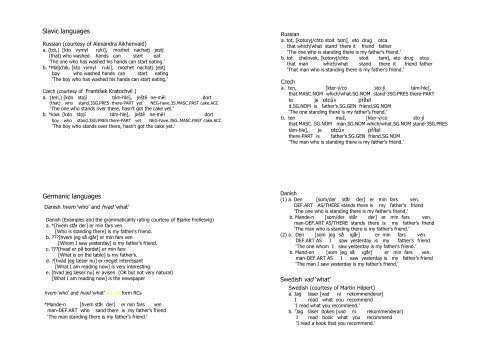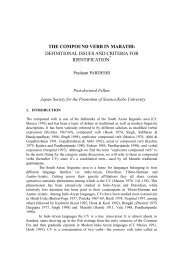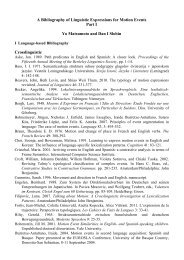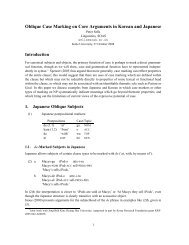Relativization and Nominalization
Relativization and Nominalization
Relativization and Nominalization
Create successful ePaper yourself
Turn your PDF publications into a flip-book with our unique Google optimized e-Paper software.
Slavic languages<br />
Russian (courtesy of Alex<strong>and</strong>ra Aikhenvald)<br />
a. (tot,) [kto vymyl ruki], mozhet nachatj jestj<br />
(that) who washed h<strong>and</strong>s can start eat<br />
‘The one who has washed his h<strong>and</strong>s can start eating.’<br />
b. *Maljchik, [kto vymyl ruki], mozhet nachatj jestj<br />
boy who washed h<strong>and</strong>s can start eating<br />
‘The boy who has washed his h<strong>and</strong>s can start eating.’<br />
Czech (courtesy of Franti!ek Kratochvíl )<br />
a. (ten,) [kdo stojí tám-hle], je!t. ne-m.l dort<br />
(that) who st<strong>and</strong>.3SG.PRES there-PART yet NEG-have.3S.MASC.PAST cake.ACC<br />
‘The one who st<strong>and</strong>s over there, hasn't got the cake yet.’<br />
b. *kluk [kdo stojí tám-hle], je!t. ne-m.l dort<br />
boy who st<strong>and</strong>.3SG.PRES there-PART yet NEG-have.3SG..MASC.PAST cake.ACC<br />
‘The boy who st<strong>and</strong>s over there, hasn't got the cake yet.’<br />
Russian<br />
a. tot, [kotoryj/chto stoit tam], eto drug otca<br />
that which/what st<strong>and</strong> there it friend father<br />
‘The one who is st<strong>and</strong>ing there is my father’s friend.’<br />
b. tot chelovek, [kotoryj/chto stoit tam], eto drug otca<br />
that man which/what st<strong>and</strong> there it friend father<br />
‘That man who is st<strong>and</strong>ing there is my father’s friend.’<br />
Czech<br />
a. ten, [kter-"/co sto-jí tám-hle],<br />
that.MASC.NOM which/what.SG.NOM st<strong>and</strong>-3SG.PRES there-PART<br />
to je otc/v p0ítel<br />
it.SG.NOM is father’s.SG.GEN friend.SG.NOM<br />
‘The one st<strong>and</strong>ing there is my father’s friend.’<br />
b. ten mu#, [kter-"/co sto-jí<br />
that.MASC..SG.NOM man.SG.NOM which/what.SG.NOM st<strong>and</strong>-3SG.PRES<br />
tám-hle], je otc/v p0ítel<br />
there-PART is father’s.SG.GEN friend.SG.NOM<br />
‘The man who is st<strong>and</strong>ing there is my father’s friend.’<br />
Germanic languages<br />
Danish hvem ‘who’ <strong>and</strong> hvad ‘what’<br />
Danish (Examples <strong>and</strong> the grammaticality rating courtesy of Bjarke Frellesvig)<br />
a. *[hvem står der] er min fars ven<br />
[Who is st<strong>and</strong>ing there] is my father's friend.<br />
b. ???[hvem jeg så igår] er min fars ven<br />
[Whom I saw yesterday] is my father's friend.<br />
c. ???[hvad er på bordet] er min fars<br />
[What is on the table] is my father's.<br />
d. ?[hvad jeg læser nu] er meget interessant<br />
[What I am reading now] is very interesting.<br />
e. [hvad jeg læser nu] er avisen (OK but not very natural)<br />
[What I am reading now] is the newspaper<br />
hvem ‘who’ <strong>and</strong> hvad ‘what’ do not form RCs<br />
*M<strong>and</strong>e-n [hvem står der] er min fars ven<br />
man-DEF.ART who s<strong>and</strong> there is my father's friend<br />
‘The man st<strong>and</strong>ing there is my father's friend.'<br />
Danish<br />
(1) a. Den [som/der står der] er min fars ven.<br />
DEF.ART AS/THERE st<strong>and</strong>s there is my father’s friend<br />
‘The one who is st<strong>and</strong>ing there is my father's friend.’<br />
b. M<strong>and</strong>e-n [som/der står der] er min fars ven.<br />
man-DEF.ART AS/THERE st<strong>and</strong>s there is my father’s friend<br />
‘The man who is st<strong>and</strong>ing there is my father's friend.’<br />
(2) a. Den [som jeg så igår] er min fars ven.<br />
DEF.ART AS I saw yesterday is my father’s friend<br />
‘The one whom I saw yesterday is my father's friend.’<br />
b. M<strong>and</strong>-en [som jeg så igår] er min fars ven.<br />
man-DEF.ART AS I saw yesterday is my father’s friend<br />
‘The man I saw yesterday is my father's friend.’<br />
Swedish vad ‘what’<br />
Swedish (courtesy of Martin Hilpert)<br />
a. Jag läser [vad ni rekommenderar]<br />
I read what you recommend<br />
‘I read what you recommend.’<br />
b. ? Jag läser boken [vad ni rekommenderar]<br />
I read book what you recommend<br />
‘I read a book that you recommend.’






